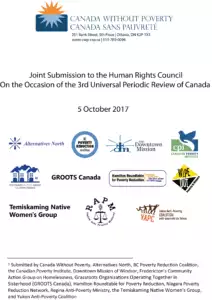This week, Canada Without Poverty (CWP), eleven partner organizations, and twelve supporting organizations in the anti-poverty movement, submitted a report to the United Nations Human Rights Council for the upcoming Universal Periodic Review (UPR).
What is the UPR?
The UPR takes place every four years in Geneva, with the last review of Canada in 2013. The UPR process is different than treaty body reviews, the review of the Convention on the Rights of Persons with Disabilities that CWP attended earlier this year, because:
- The Member States of the UN Human Rights Council conduct the review, which means that countries like Portugal, Cuba, and Malaysia will be the ones asking questions and making recommendations to Canada; and
- Canada’s entire human rights record will be under review, which means questions and recommendations can cover everything from the regulations of Canadian mining companies to the need for a rights-based approach in Canada’s Poverty Reduction Strategy.
This cycle of the UPR, Canada’s third review, will happen in April or May of next year. The review starts with Members of the Council asking Canada questions, followed by the release of their written recommendations. Canada will then have an opportunity to submit a report back to the Council on which recommendations they intend to implement.
Why is the UPR so important?
Just like at UN treaty body reviews, Non-Governmental Organizations (NGOs) like Canada Without Poverty will have an opportunity to participate in this review and shine a light on violations of human rights that are happening in the country. The first step for civil society is to submit a report; in the spring, groups will plan meetings with Members of the Human Rights Council and report back on the review to those in Canada from Geneva.
As the current government was elected in 2015, this is the first opportunity to demonstrate a genuine commitment to human rights, and in particular, to economic and social rights for people in poverty. At this review, Canada has a chance to show that we can be a global leader on human rights for the most marginalized by implementing policies, laws, and programs under a rights-based approach.
What are the big poverty issues that will be raised at the UPR?
To build a strong submission on economic and social rights in Canada, CWP has teamed up with some amazing partners from across the country, including: Alternatives North, BC Poverty Reduction Coalition, the Canadian Poverty Institute, Downtown Mission of Windsor, Fredericton’s Community Action Group on Homelessness, Grassroots Organizations Operating Together in Sisterhood (GROOTS Canada), Hamilton Roundtable for Poverty Reduction, Niagara Poverty Reduction Network, Regina Anti-Poverty Ministry, the Temiskaming Native Women’s Group, and Yukon Anti-Poverty Coalition.
Together, we’ve put together information for the Human Rights Council on where Canada has progressed on poverty and human rights, where we’ve remained stagnant, and where we’ve actually moved backwards since the last review in 2013. Here’s an excerpt from our submission:
People in Canada face increasing barriers to exercising economic and social rights. It is nearly impossible to ascertain by what means and mechanisms those who are marginalized can hold the government to account for rights protected under the ICESCR. For example, in a recent Ontario Court of Appeal decision, Tanudjaja v. Attorney General of Canada, the court agreed with the Attorneys General of Canada and Ontario that people living in poverty should be denied the ability to claim their right to housing in court, even where their housing circumstances violate other enumerated Charter rights, like the right to life or to equality. Effectively, the government of Canada and Ontario argued and the court agreed that Charter remedies for violations of socio-economic rights for the most disadvantaged people in the country should be prohibited. Additionally, Canada does not recognize discrimination on the basis of social condition (e.g. socio-economic disadvantage) in the Canadian Human Rights Act.
To read the full submission, click the on the cover page image below.

